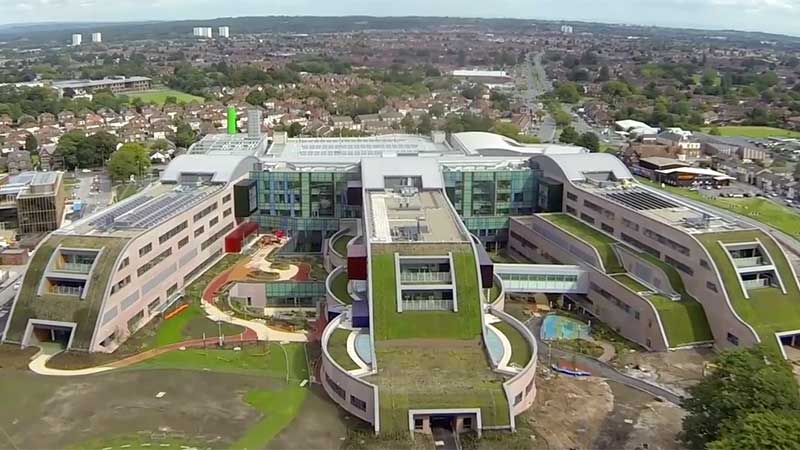
Alder Hey Children’s NHS Foundation Trust has signed a deal to use IBM Watson to create the UK’s first cognitive hospital. This is a multi-year deal with the Science and Technology Facilities Council’s (STFC) Hartree Centre with support from IBM.

In June 2015 IBM announced a £313 million deal with the UK Government to support the STFC at the Hartree Centre. As part of that deal, IBM and the STFC agreed to develop new solutions around big data and IBM Watson. At the time it was announced that any solutions stemming from this collaboration would be jointly marketed by both parties with revenue also being shared. What is not clear here is whether this project is based on that deal and whether this is a pilot for a solution that IBM and STFC will target at other medical facilities around the world.
This would certainly appear to be a distinct possibility. In the press release Mr Iain Hennessey, a paediatric surgeon and Director of Innovation at Alder Hey said: “This is an unprecedented opportunity for Alder Hey to pilot this ground breaking technology and learn how to transform IT capability and working practices in healthcare, not just in the UK but across the world. Helping our patients and their families prepare properly for coming into hospital will really reduce their anxiety and could mean we can get them better and home faster.”
All about improving the patient experience
The press release states that: “Watson technology will be applied to improve patient experience in the United Kingdom.” What that translates to is that if this is successful it will: “..enhance patient care and potentially generate savings for both the hospital and the UK National Health Service (NHS) as a whole.”
Watson will be used to analyse voluntary feedback from patients. This is interesting as it presents a range of challenges. One of these is that Alder Hey is a children’s hospital so the question is whether the feedback will really be from patients or their parents? Another question is whether IBM will use the Emotion APIs that it announced at IBM Interconnect in Las Vegas back in February?
The press release talks about IBM looking to address patient anxieties which would certainly be easier if IBM were to be using the Emotion APIs. However, the environment would be challenging as the software would need to be able to determine whether the responses were affected by stress or anxiety. The latter, of course, being the target for the solution to resolve.
As might be expected where Watson is being deployed into a medical environment there is talk of improving clinical care. This could include a range of new services such as highly personalised treatment plans as seen with cancer patients. Another option would be to help select patients for clinical studies by selecting those patients most likely to respond to the study.
For those patients with chronic illness there is a plan to integrate mobile apps so that patient data can be monitored remotely enabling proactive admissions rather than waiting for symptoms to require emergency treatment. The monies for developing the app are being provided through funds raised by the Alder Hey Children’s Charity.
Cost saving also a goal
By having all patient data digitised, using personalised treatment plans and by using data from the app to admit early, Alder Hey hopes that it will speed up the movement of patients though the hospital system. One hope is that it will reduce the number of days that children spend in the hospital which will certainly improve the overall experience and reduce costs to the NHS but only if that reduction is time does not compromise treatment.
There is also an expectation that the system will lead to better usage of resources and help the hospital control its spending. This is a critical issue across the NHS. If Watson can be shown to reduce the cost per patient without compromising clinical care and improve patient satisfaction it stands to be widely deployed by many NHS trusts.
Conclusion
Hospital admission is always a stress point irrespective of the age of the patient. By focusing this project on improving paediatric care to make it less stressful Alder Hey and the STFC are targeting one of the most vulnerable groups in the healthcare system. If this is a success at Alder Hey there are several other sites in the UK and around the world where the solution could be deployed.
It will be interesting to see just how quickly results are reported. While this is a multi-year project there will be a lot of people looking for quick wins to ensure that monies are not being diverted from within healthcare, especially at a time when funding for the NHS is so politically charged.
One of the surprises here is that there is no mention of cloud or other technologies beyond Watson. The original announcement of the deal with IBM and the STFC talked about OpenPower and the use of the SoftLayer cloud centre at Chessington in London.


























[…] In June 2015 IBM announced a £313 million deal with the UK Government to support the STFC at the Hartree Centre. As part of that deal, IBM and the STFC agreed to develop new solutions around big data and IBM Watson. At the time it was announced that … Enterprise Times […]